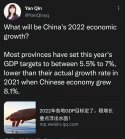its not really a problem, work that is hard to automate but low skill like waiter, nursing assistant, etc. will simply rise in wages. even today only ~50% of Chinese youth go to college.A remarkably balanced article from the Western media. Perhaps they realise that if they push their propaganda lies too much, their middle-management midwits will start believing that China truly is about to collapse etc.
I didn't learn anything new, but a few things are worth highlighting.
All in all, a gradual move away from investment-heavy growth, which has been ongoing since 2010, is not as bad as many assumed. China's human capital improvement between the generations is going to be massive. American boomers were remarkably well-educated thanks to the GI bill. The same is not true for China.
- China's boomers are atrociously poorly educated. The youth are not. This means that productivity increases should be very substantial for decades as a far-better educated generation slowly replaces the old ones.
- The downside is that the newer generation may not be as willing to do "dirty" jobs as their aspirations rise.
- China still has ~25% of its workforce in agriculture. The average for high-income countries is 3%. The potential for mechanisation is very large.
- Despite very high investments, China's return on capital is still substantial, though it has fallen.
- China's population barely grew last year and will likely start declining this year.
The article's big emphasis on China's aging and soon-to-be declining population is a bit strange to me, given that America's population grew by just 0.1%. And as many people have pointed out, China is now a net-receiver of world talent compared to the mid-2010s. So immigration is unlikely to be as helpful to the US as in the past.
The big problem on the horizon is work that is hard to automate but low-skill. Some of that can be covered by domestic labour but not all, especially as the educational levels and aspirations of Chinese youth increases. This is natural. How many western youth want to be farm hands? The West has "solved" this by cheap labour migration. China is unlikely to accept large, low-skill migration.
You are using an out of date browser. It may not display this or other websites correctly.
You should upgrade or use an alternative browser.
You should upgrade or use an alternative browser.
Chinese Economics Thread
- Thread starter Norfolk
- Start date
venture socialists actually because unlike venture capitalists the profit earned from investment is returned to the people.
Very good article, that explains very clearly the government plan of where they want to go.
First the important distinction had to be made at the start of the article.
To understand this, we need to make a clear distinction between digital economy as a whole and the internet platform industry. Recent regulations in the digital economy mainly focussed on fintech and platform companies like Ant Group, Alibaba Group and Meituan. But the digital economy is much bigger than that and the party has clear plans for the direction it should head into, as we will see in a speech by Xi Jinping himself and an article by prominent economist Liu Shijin.
Then to sum it all up, the last paragraph did just that.
So, there you have it. The digital economy is essential for upgrading industries and improving productivity in order to compete globally. This is a continuation of a direction previously taken with policies like Internet Plus, and . In the meantime, China is not getting rid of its platform industries, which are important for the domestic consumption economy. But in the platform industry will continue to be rectified. More on that in a future article.
In other words, tech will be used as a driver to improve efficiency across the board in the real economy.
Whereas the platforms tech will be scrutinized in case they turn into monopolistic entities.
Nothing more, nothing less!
Very smart of China to prevent the platform tech companies to not go into cyber rent seeking mode.

